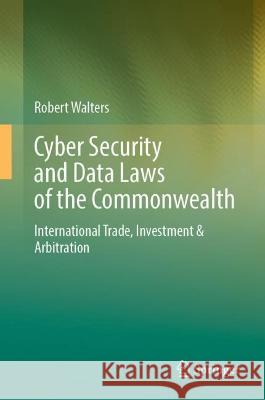Cybersecurity and Data Laws of the Commonwealth » książka
topmenu
Cybersecurity and Data Laws of the Commonwealth
ISBN-13: 9789819939343 / Angielski / Twarda / 2023
Cybersecurity and Data Laws of the Commonwealth
ISBN-13: 9789819939343 / Angielski / Twarda / 2023
cena 644,07
(netto: 613,40 VAT: 5%)
Najniższa cena z 30 dni: 616,85
(netto: 613,40 VAT: 5%)
Najniższa cena z 30 dni: 616,85
Termin realizacji zamówienia:
ok. 22 dni roboczych.
ok. 22 dni roboczych.
Darmowa dostawa!
The book has been authored by a highly regarded international legal scholar and practitioner in transnational commercial and private law. The book highlights how the legal landscape for data protection, cross-border data flows and cybersecurity law is highly diverse and fragmented amongst all commonwealth countries. The book focuses on addressing the gaps in data, cybersecurity and national arbitration law of these countries. This is because, data and cybersecurity underpin digital trade and investment. The aim of this book is to promote more engagement and collaboration between commonwealth countries, to ensure they capitalise on the growing digital economy.
Notwithstanding the above, the digital economy is rapidly changing the way we work and live. When coupled together cybersecurity and data law will be an important components of the future digital economy. That said, there will likely be disputes, and international arbitration can be an effective legal mechanism to resolve trade and investment disputes across the digital economy. On that basis, this book augments how the respective laws of commonwealth countries, along with the model data and cyber laws of the Commonwealth should be reviewed to minimise any legal divergence. More legal convergence is needed.
This book provides a comparison and practical guide for academics, students, and the business community of the current day data protection laws and cross-border data flows among all commonwealth countries.











